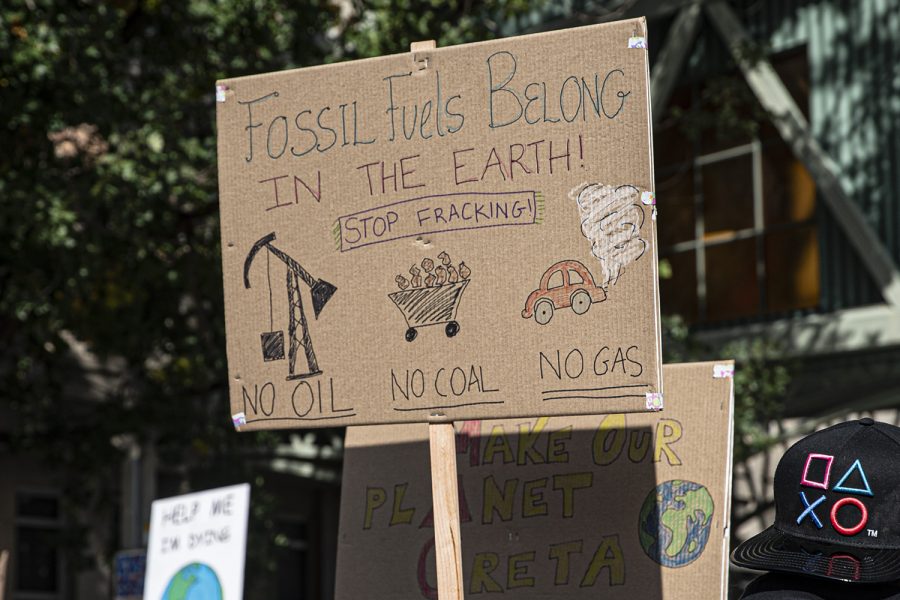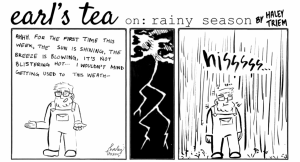Editorial: The University of Iowa must declare a climate emergency
The environmental crisis is too important for the UI to stay silent.
A group of protestors hold signs in downtown Iowa City while waiting for Greta Thunberg to speak on Friday, October 4th, 2019. Greta Thunberg is speaking in Iowa City as part of a local strike against climate change.
October 6, 2019
It’s time to get some adults in the room in the local conversation surrounding climate change, but it seems many leaders want to leave the conversation to the kids.
Swedish activist Greta Thunberg led a climate strike Oct. 4 that drew thousands to Iowa Avenue and Dubuque Street and railed against institutional inaction against climate change. Among other things, leaders at the protest called for end of coal burning at the University of Iowa Power Plant. Those who spoke at the event included Thunberg, Iowa City Mayor Jim Throgmorton, and Iowa City Climate Strikers leader Massimo Biggers.
While many of different ages, backgrounds, and organizations spoke, a key constituency went unrepresented: the UI. Thunberg came to Iowa City and drew an international spotlight, opening an opportunity to call for bold action to combat climate change, but our school’s leaders remained close to silent with the world watching Iowa City. The UI, it seems, is unwilling to vocally commit to taking serious action to adequately combat the climate crisis.
The climate strikers on Oct. 4 dedicated 11 minutes of silence to recognize the 11 years that remain until 2030, understood to be the practical deadline to act on reversing climate change. But the situation remains dire now. Instead of hiding behind its promise to be coal-free by 2025, the UI should go further to dedicate all feasible resources to reducing carbon emissions, promoting sustainability, and fighting climate change on campus immediately.
As The Daily Iowan previously reported, the climate strikers say the UI has not addressed the strikers directly, even after delivering an open letter calling for UI President Bruce Harreld to take action. Even with thousands organized to support climate action, the UI simply reiterates previously set targets.
When speaking to the DI Oct. 4, UI Senior Vice President for Finance and Operations Rod Lehnertz said the UI needs “to do the right thing by our university, by our community, by our universe,” adding that “we should aim to do and do it together, and not at odds.”
That’s exactly why climate activists including Thunberg and Biggers have voiced so much frustration with local and world leaders — the “right thing” is not being accomplished.
It is not as if the UI has done nothing to reduce its carbon emissions. The ambitious goal of making the UI Power Plant coal-free by 2025 is widely regarded as the fastest economic option. This inspired chants of “end coal now” at the Oct. 4 rally.
Of course, as Lehnertz told the DI, immediately ending the use of coal at the Power Plant without an alternative would result in a lack of power on campus. Something must be done in the interim.
If there was a switch to move from dangerous pollutants to sustainable energy, the UI and many others would have flipped it already. The switch to cleaner fuels such as natural gas and biomass unfortunately takes more time than many would like. However, the use of natural gas is troubling, since its methane emissions are an unsustainable greenhouse gas as well. The UI is simply moving too slow.
UI Student Government and the Graduate and Professional Student Government in September declared a climate call to action, urging the UI to lead the way in fighting climate change. Lehnertz said UI leaders, including himself, were present when the student governments passed that joint resolution because “we believe in it.”
Sluggishness is another problem pointed out by Thunberg, Biggers, and other climate activists. The UI is moving, but the pace is too gradual compared with the enormity of our warming planet. We must do more. To create a safe world for the future, there must be an eventual end to the widespread use of fossil fuels.
Strikers are right to point out the UI’s lack of leadership on this issue. The absence of “adults in the room,” as Thunberg described the lack of leadership by people in high-ranking positions, has been an obstacle in fighting climate change long before the Oct. 4 demonstration.
The UI must take our current environmental crisis seriously, and it must commit to being vocal about finding solutions. One way to signal this push would be to declare a climate emergency, in line with the Iowa City City Council and the UI Student Government.
If the UI truly wants to work together on climate change, it needs to open dialogues and take action, not end conversations and rest on their laurels.
Editorials reflect the majority opinion of the DI Editorial Board and not the opinion of the Publisher, Student Publications Inc., or the University of Iowa.
Editorial board members are Marissa Payne, Brooklyn Draisey, Elijah Helton, and Taylor Newby.





